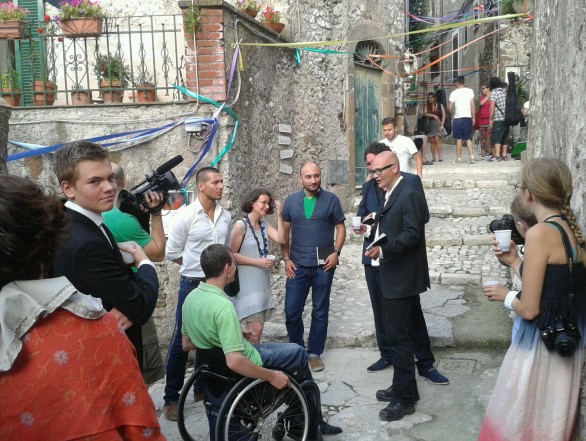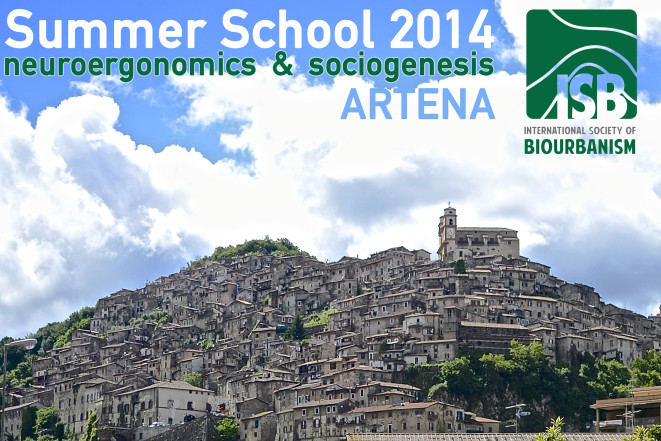Submitted by WA Contents
International Society of BiOurbanism
United Kingdom Architecture News - Jun 23, 2014 - 16:13 4030 views
Summer School 2014 in Neuroergonomics and Sociogenesis
''What if,instead of breaking them,the design of cities could naturally feed social ties? There must be a way for Urban Planners to make cities more human-centred and happy,by focusing on the effects that the built environment has on sociality''
This ISB Summer School presents a challenging programme in “Neuroergonomics and Sociogenesis”, to be held in Artena, Italy, on July 13th-20th.
The program offers seven full days of lectures, practical workshops, and design studios with international experts for exploring how to design urban environments able to revive, support, nourish, and enhance sociality and human relationships.

Space design can nurture or damage our well-being and our social relations. A scientific knowledge, both theoretical and practical, of how human neurophysiology reacts to the organization and the shapes of space, is the first step for producing a really sustainable and social new design for the 21st century.
This residential course is aimed at architects, designers,engineers, artists, psychologists, social scientists, policy makers, economists, sociologists, social activists and students from universities, who are keen to study Neuroergonomics Design, a new field of practice and research with relevant professional opportunities.
The numerous examples of beautiful and harmonious urban solutions built during the last millennia in the area (Artena, Segni, and the gorgeous surroundings), will allow us to experience and test the theories about Biourbanism, complex systems, bottom-up codes, pattern language, and sociogenesis on-site.
Teaching staff
Professor Besim Hakim (keynote speaker) Fellow of the American Institute of Certified Planners, Harvard graduate in Urban Design, he is the worldwide expert in Mediterranean urban codes. His deep and groundbreaking researches started in the ’70s reveal the hidden rules of traditional towns’ unfolding in North Africa, Spain, Greece, Italy. His book Mediterranean Urbanism: Historic Urban / Building Rules and Processes is expected to be published by Springer this year. His publications include several studies on urban processes and codes spanning the period from the 6th to the 19th centuries A.C., and the books Arabic-Islamic Cities: Building and Planning Principles[1979] 1986, 1988, 2008, and Sidi Bou Sa’id, Tunisia: Structure and Form of a Mediterranean Village 1978, 2009.
Professor Antonio Caperna, president International Society of Biourbanism, professor at Roma Tre University, visiting professor at University of Derby, architect. Senior Lecturer in Sustainable Urban Planning & Design, he’s an expert in ICT and urban environment. Associate editor of the International Journal of E-Planning Research (IJEPR) and of the Journal of Biourbanism (JBU), academic counselor at the Kingdom University of Bahrain, Architectural Engineering Dept., and consultant at the Portuguese Agency for Assessment and Accreditation of Higher Education.
Professor Marco Casagrande, owner at C-Lab, president Ruin Academy, vice-president International Society of Biourbanism, European Prize for Architecture 2014. He is a notorious architect, artist, and social activist who concentrates his efforts in bringing back cities to life and nature. His “biourban acupuncture” approach brings in tools for small changes that affect the urban and social wholeness, while his “Paracity” project aims at supporting local communities with resilience and autonomy. He has been invited to the most prestigious exhibit venues, like MAK in Vienna, or the Biennale di Venezia. His latest book is Biourban acupuncture. From Treasure Hill of Taipei to Artena, 2014.
Menno Cramer, Researcher at the International Society of Biourbanism, he is a PhD candidate in Neuroscience & Design at the University of Sheffield with an interdepartmental research between the Medical School and the School of Architecture. BS at the Roosevelt Academy, University Utrecht, he currently works in London to obtain work experience in the field between user needs and design implementation. Co-founder at Innovation Centre, University College Roosevelt, he is currently investigating how sensory pathways are linked to health and well-being as well as higher cognitive processes, in order to provide architects, designers and planners with evidence based knowledge on how their design directly acts upon the behaviour of humankind.
Katherine Donaghy, Lecturer at the International Society of Biourbanism, Programme Officer at Urban Design London, Co-founder at Innovation Centre, University College Roosevelt, MA Graduate in Town and Regional Planning at University of Sheffield, Katherine is a sociologist with an interest in urban design and psychology. She has done various evaluation consulting on urban design projects using sociology and psychology between France, England, The Netherlands and Italy.
Arch. Angelica Fortuzzi, Phd in Urban Design, Lecturer at the International Society of Biourbanism, architect and researcher, she focuses on placemaking, urban transformation, renewable energy and bio-climatic design, collaborative design. She participated in numerous conferences and seminars both in Italy and abroad. Among her works: urban regeneration processes in Glasgow, Edinburgh and Berlin and the service design for Progetto Artena. She was researcher at the University of Strathclyde (UK) and the University of Roma Tre. Member of the INU National Commission for Participation; Executive Committee member of Eurosolar Italia; member of the Department of Sustainable Design and Energy Efficiency (Professional Order of Architects of Rome).
Dr. Stefano Serafini, Director of research & Secretary general International Society of Biourbanism, vice-president Kazhak-Italian Association for the Biourban Study of Monotowns, philosopher and psychologist he is an independent scholar and social activist who focuses on intentionality, epistemology of design, laws of form, and is committed with strategic consulting and regional development. His works have been published in several journals and miscellaneous books. He has founded and directed publishing houses, educational societies, tourism and congress companies. He teaches, lectures and advices in several Countries, from USA to the Russian Federation.
Professor Diogo Teixeira, Senior Lecturer of urbanism and constructuion technology at University of Saint Joseph in Macau (China). He holds degrees in civil engineering from the Technical University of Lisbon and urban design from the University of Paris, and is currently a doctoral candidate in architecture at the Technical University of Lisbon. Co-founder of Expoente, Beta-i, and partner at A Cidade e as Terras he worked in Portugal, Spain, the Netherlands, Cape Verde, China, the Antarctica, England. Especially interested in event-based design strategies for enhancing place attachment, he believes in collaboration, transdisciplinary dialogue and learning by doing as fundamental tools to invent and build sustainable futures.
Professor Eleni Tracada, University Principal Tutor and Head of the Built Environment Research Group at Derby University, editor in chief Journal of Biourbanism (JBU). She is a Senior Lecturer in Built Environment (Architecture) at Derby University, especially focusing on self-built design, sensory awareness/resposiveness, complexity and sustainability, after her study experience with the most relevant protagonists of Italian Architectural Design (Leonardo Savioli, Adolfo Natalini, Giovanni Michelucci), Conservation and Restoration (Marco Dezzi-Bardeschi), History of Architecture (Emilio Battisti, Klaus Coening), Urban Planning and Social Architecture (Edoardo Detti).
Location
The workshop will be held in Artena (Rome), Italy, a beautiful and picturesque little town dating back to the 13th century and placed on a hill in the Lepini Mountains, 420 m above the sea level and 40 km South of Rome. This is a perfect place to visit the fascinating surrounding area, with historical towns such as Palestrina, Segni, Anagni, Sermoneta and Norma, and many gorgeous natural beauties. It is located just 40 minutes from Rome (both by train or car). The climate is mild, and this makes summer very pleasant.
Accommodation
Living and working together in a special biophilic and historical environment is a relevant part of the I.S.B. school experience. Students will be accommodated in the historical village centre, enjoying the typical local architecture.
Social activity
There are excursions with stages of drawing/photography in order to live study sharp and amazing biourban issues. We will also visit the medieval city of Segni, and the city and gorgeous beach of Sperlonga, which will give us a few hours of crystalline sea, sun, and relaxation.
Language: English
FEE: € 550,00 that includes course materials, a guided tour, a party. The fee does not include accommodation, meals, and trip from your Country to the Summer School Campus.
Lodging € 185,00 (price for 7 nights in a Bed & Breakfast, double sharing) + meals € 115,00 (price for 7 dinners). We kept the course’s tuition as low as possible in order to make the School affordable to as many valuable people as possible.
Registration deadline: 30.06.2014
For detailed information please visit website
> via biourbanism.org

